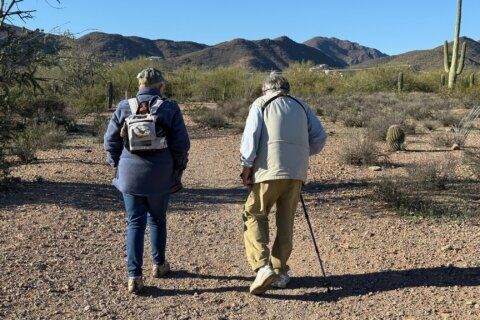This video is no longer available.
In previous days, it was the key to flirting: making eye contact.
Now, in 2024, researchers understand it’s vital to effective communication — and young people engrossed in their phones might not realize.
Eye contact isn’t just the realization that you’ve caught another person’s attention.
“It’s actually a very, very profound and powerful way of making an interpersonal connection,” said Professor Melissa Perry, dean of the College of Public Health at George Mason University, who recently published an article on the subject in Psychology Today.
“Making eye contact allows us to interpret friend or foe, and how to recognize how we’re coming off” to others, Perry said.
A person looking at their phone, communicating by text or email, is deprived of the benefits of in-person eye contact.
“Great brain image studies demonstrate what happens when you make eye contact with another person — there’s a term called ‘interbrain synchrony,'” Perry said. “You can tell they’re listening, they’re attentive and I can even read how I’m coming off, just based on how they’re responding, through the way they look at me, or the expression on their face, or other nonverbal” clues.
Communicating digitally, without the benefit of eye contact, increases the risk of miscommunication, Perry said.
“There’s an old adage, ‘The first mistake that we make in communication is assuming that it’s happened,'” said Perry. “We believe that the way we’re communicating in a flat digital interface is transmitting what we mean, and that the person on the other end understands it.”
However, that’s not always the case.
For frustrated parents who struggle with getting their children to glance up from their phones to engage in eye contact, “Perhaps our younger generation, they’re simply not aware of what’s being lost,” Perry said.
Perry is hopeful that young people who are exposed to eye contact can make it part of their communication repertoire.
“Just simply have conversations — not nagging conversations,” Perry said. “Simply caring, compassionate conversations, and also exploring ways that families can have non-screen time, and be disconnected” from digital tools.
Get breaking news and daily headlines delivered to your email inbox by signing up here.
© 2024 WTOP. All Rights Reserved. This website is not intended for users located within the European Economic Area.








